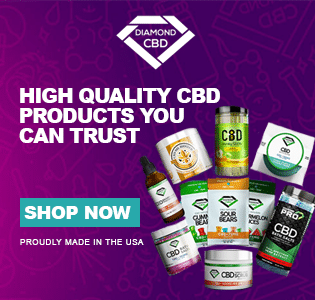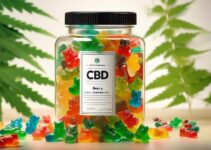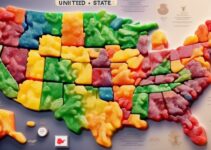Have you noticed that the CBD industry has experienced remarkable growth, with the market size of CBD gummies alone expected to reach $6.94 billion by 2026? You might be wondering what has led to the federal legalization of CBD gummies. The recent changes in legislation have sparked a significant shift in the status of CBD products, and understanding the reasons behind this shift is crucial for consumers and industry professionals alike.
Key Takeaways
- CBD gummy regulations have changed over time due to shifting public perception and scientific research.
- The 2018 Farm Bill legalized the production and sale of hemp-derived CBD products, leading to increased consumer awareness and market expansion.
- The Farm Bill removed hemp from the Controlled Substances Act, making it federally legal to cultivate and distribute hemp-derived products, including CBD.
- The FDA is actively exploring potential pathways for legalizing CBD products, including gummies.
History of CBD Gummy Regulations
Since the early 20th century, the regulation of CBD gummies has undergone significant changes in response to shifting attitudes and scientific research. The evolution of regulations surrounding CBD gummies has been influenced by the changing public perception of cannabis and its derivatives. In the early 1900s, cannabis products, including CBD, were generally unregulated in the United States. However, as public perception shifted and concerns about the potential risks of cannabis grew, regulations became more stringent. The Marihuana Tax Act of 1937 imposed strict regulations on the cultivation, distribution, and use of cannabis, including CBD. These regulations persisted for decades, contributing to the stigmatization of cannabis and limiting scientific research into its potential benefits. In recent years, as attitudes towards cannabis have shifted again, there has been a gradual relaxation of regulations surrounding CBD, particularly with the passage of the 2018 Farm Bill, which legalized the production and sale of hemp-derived CBD products. This changing landscape reflects the ongoing interplay between public perception and regulatory decision-making in the realm of CBD gummy products.
Farm Bill and CBD Legalization
You should understand the impact of the Farm Bill on the legalization of CBD products. The process of CBD legalization under the Farm Bill is essential knowledge for consumers. The federal law's influence on the availability and regulation of CBD should also be explored.
Farm Bill Overview
The Farm Bill's impact on CBD legalization has been a significant milestone in the evolving landscape of federal legality for CBD products. The 2018 Farm Bill removed hemp from the list of controlled substances, legalizing its cultivation, and paving the way for widespread production and distribution of CBD products. This legislation has led to increased consumer awareness and access to CBD-infused products, contributing to the booming market for CBD edibles like gummies. Below is a table summarizing the key implications of the Farm Bill on CBD legalization:
| Farm Bill Implications | Consumer Awareness | Market Growth |
|---|---|---|
| Legalization of hemp cultivation | Increased knowledge about CBD benefits | Rapid expansion of CBD product availability |
| Removal of hemp from controlled substances list | Growing demand for CBD edibles | Economic opportunities for farmers and businesses |
| Regulation of CBD production | Shift towards natural remedies | Diversification of CBD product offerings |
CBD Legalization Process
The 2018 Farm Bill's impact on CBD legalization has set the stage for understanding the process of CBD legalization, specifically focusing on the relationship between the Farm Bill and the broader scope of CBD legalization. The CBD legalization process involves navigating various regulatory challenges, and the Farm Bill plays a pivotal role in shaping the legal landscape for CBD products. Here's how the process unfolds:
- Federal Legalization: The Farm Bill legalized hemp-derived CBD at the federal level, removing it from the list of controlled substances.
- State Implementation: While the Farm Bill legalized hemp-derived CBD at the federal level, individual states have the authority to regulate CBD within their borders.
- FDA Regulations: The Food and Drug Administration (FDA) continues to grapple with establishing clear regulatory guidelines for CBD products, posing a significant challenge to the overall CBD legalization process.
Federal Law Impact
The Farm Bill's impact on CBD legalization has reshaped the legal landscape for hemp-derived CBD products at the federal level. This legislation removed hemp from the Controlled Substances Act, making it federally legal to cultivate and distribute hemp-derived products, including CBD. As a result, federal law impact on CBD has led to a surge in consumer demand for CBD-infused products, such as gummies, oils, and capsules. With the removal of hemp from the Controlled Substances Act, CBD products can now be legally produced, sold, and consumed in accordance with federal regulations. This shift has provided a clear framework for the production and sale of hemp-derived CBD products, meeting the rising consumer demand for natural alternatives. As a consumer, you can now access a wider range of CBD products due to the changes in federal law.
FDA's Stance on CBD Gummies
The FDA's stance on CBD gummies plays a crucial role in their federal legality. Understanding the FDA regulations on CBD and its impact on consumers is essential for navigating the legal landscape. The legalization of CBD gummies is directly influenced by the FDA's approach to this popular product.
FDA Regulations on CBD
For those considering the purchase of CBD gummies, it's important to be aware of the FDA's regulations and stance on the use of CBD in these products. The FDA has issued guidelines and regulations concerning the use of CBD in consumer products to ensure consumer safety. Here's what you need to know:
- Legal Status: The FDA currently prohibits adding CBD to food or marketing it as a dietary supplement. However, they are exploring regulatory pathways for CBD products, including gummies.
- Quality and Purity: The FDA emphasizes the importance of ensuring the quality and purity of CBD products. It's crucial to choose gummies from reputable manufacturers who adhere to good manufacturing practices.
- Health Claims: The FDA strictly regulates health claims associated with CBD products, including gummies. Companies are not allowed to make unsubstantiated health claims about their products.
Legalization of CBD
Despite the FDA's current restrictions on CBD in food and dietary supplements, the federal agency is actively exploring potential pathways for legalizing CBD products, including gummies. Public perception plays a significant role in this process, as the increasing acceptance and demand for CBD-infused products, such as gummies, have prompted the FDA to reevaluate its stance. Additionally, ongoing medical research into the potential health benefits of CBD has sparked discussions about the need for clear regulations that ensure product safety while allowing consumers access to these products. The FDA is closely monitoring this research to determine the safety and efficacy of CBD, which could influence its decision on the legalization of CBD gummies. As public opinion evolves and medical findings continue to emerge, the FDA's approach to CBD products, including gummies, may undergo further changes.
Impact on Consumers
As the FDA reevaluates its stance on CBD products, including gummies, consumers are keen to understand the potential impact of the agency's evolving position on the accessibility and safety of these products. The FDA's changing stance on CBD gummies could have the following effects on consumers:
- Consumer Benefits: With clearer regulations, consumers may have access to a wider variety of high-quality CBD gummies, potentially leading to better efficacy and more tailored options for individual needs.
- Market Impact: The FDA's evolving position could lead to increased consumer confidence, potentially fueling market growth and encouraging more research and innovation in the CBD gummy industry.
- Safety Assurance: A clearer regulatory framework can provide consumers with reassurance regarding the safety and quality of CBD gummies, ensuring they meet specific standards and labeling requirements.
THC Content Restrictions
To comply with federal regulations, CBD gummies must contain no more than 0.3% THC. This THC restriction is crucial for ensuring that CBD gummies are legal at the federal level. To meet this requirement, manufacturers conduct THC testing to verify that their products contain less than the legal limit. Additionally, product labeling plays a significant role in THC content restrictions. CBD gummy packaging must accurately display the THC content to inform consumers about the product's compliance with federal regulations. By clearly indicating the THC percentage on the label, consumers can make informed decisions when purchasing CBD gummies, knowing that they are within the legal THC limit. It's important to note that exceeding the 0.3% THC limit can result in legal repercussions for both manufacturers and consumers. Therefore, strict adherence to THC content restrictions through testing and accurate product labeling is essential for ensuring compliance with federal regulations and maintaining the legality of CBD gummies.
Quality and Labeling Requirements
Adhere to stringent quality and labeling requirements to ensure that CBD gummies meet federal regulations and provide consumers with accurate product information. The following factors are crucial in meeting these requirements:
- Labeling Requirements: CBD gummy labels must accurately reflect the product's ingredients, including the amount of CBD and other cannabinoids present. Additionally, labels should include clear directions for use and any potential allergens to ensure consumer safety.
- Product Testing: Rigorous testing for potency, purity, and contaminants is essential to guarantee the safety and quality of CBD gummies. Certificates of analysis from third-party laboratories should be readily available to confirm that the product meets the specified standards.
- Quality Control, Ingredient Sourcing: Implementing strict quality control measures throughout the manufacturing process is imperative. From sourcing high-quality, organic hemp to maintaining precise manufacturing standards, ensuring consistency and reliability is paramount in producing CBD gummies that comply with federal regulations and meet consumer expectations.
State Vs. Federal Regulations
Meeting stringent quality and labeling requirements for CBD gummies is crucial, but now let's explore how these standards differ between state and federal regulations. When it comes to CBD products, including gummies, the industry is faced with navigating a complex web of regulations at both the state and federal levels. Understanding the variations between state and federal regulations is essential for businesses to ensure compliance and avoid potential legal issues. The table below provides a simplified comparison of some key differences between state and federal regulations, highlighting the varying requirements and their potential impact on the industry.
| Aspect of Regulation | State Regulations | Federal Regulations |
|---|---|---|
| THC Content Limit | Varies by state | 0.3% |
| Licensing | State-specific | Required |
| Labeling Requirements | Varies by state | Strict guidelines |
| Testing Standards | Varies by state | Uniform standards |
Navigating the differences between state and federal regulations can pose significant challenges for CBD gummy manufacturers and distributors. State regulations often vary widely, creating a complex landscape for businesses operating in multiple states. On the other hand, federal regulations provide a more uniform framework but also come with their own set of stringent requirements. Understanding and adhering to both sets of regulations is crucial for ensuring compliance and minimizing any negative impact on the industry.
Compliance With Health Claims
Ensuring compliance with health claims is essential for CBD gummy manufacturers and distributors to maintain transparency and consumer trust. As the market for CBD products continues to expand, it is crucial to navigate the regulations surrounding health claims to avoid misleading consumers and potential legal consequences. Here are three key points to consider when it comes to compliance with health claims in marketing CBD gummies:
- Accurate Representation: When promoting the health benefits of CBD gummies, it's important to ensure that all claims are supported by credible scientific evidence. Misleading or exaggerated health claims can erode consumer trust and lead to regulatory scrutiny.
- FDA Guidelines: The Food and Drug Administration (FDA) has specific regulations regarding health claims for dietary supplements, including CBD products. It's imperative to stay updated on the FDA's guidelines to ensure compliance with marketing strategies.
- Transparency: Openly communicate the potential health benefits of CBD gummies while also being transparent about the limitations and areas where scientific evidence is still emerging. This approach fosters trust and credibility with consumers.
Hemp Sourcing and Farming Practices
To ensure the quality and integrity of CBD gummies, sourcing hemp from reputable farms with sustainable practices is crucial. Hemp cultivation plays a vital role in the production of high-quality CBD products. By partnering with farms that prioritize sustainability practices, CBD manufacturers can ensure that their hemp is grown in an environmentally responsible manner. Sustainable hemp farming practices focus on minimizing the environmental impact, conserving natural resources, and promoting biodiversity. These practices not only benefit the planet but also contribute to the overall quality of the hemp used in CBD gummies. When hemp is cultivated sustainably, it is free from harmful chemicals and pesticides, resulting in a purer and more natural end product. Here's a table outlining key sustainable farming practices in hemp cultivation:
| Sustainable Farming Practices | Description |
|---|---|
| Organic Farming | Avoids synthetic chemicals and GMOs |
| Crop Rotation | Enhances soil health and fertility |
| Water Conservation | Efficient use of water resources |
Future Outlook for CBD Gummy Regulation
Looking ahead, the regulatory landscape for CBD gummies appears to be evolving rapidly, prompting industry stakeholders to adapt their practices and comply with changing requirements. The future outlook for CBD gummy regulation holds significant implications for both businesses and consumers. Here's what you need to know:
- Increased Scrutiny: As the CBD industry continues to expand, regulatory agencies are likely to increase their scrutiny of CBD gummies. This could lead to more stringent testing, labeling, and marketing requirements to ensure consumer safety and product quality.
- Potential Standardization: In the future, there may be a push for standardized regulations governing the production and sale of CBD gummies. This could bring about more consistency in product quality and potency, providing consumers with greater confidence in the products they purchase.
- Consumer Impact: The evolving regulatory landscape will directly impact consumers, influencing the availability, pricing, and variety of CBD gummies in the market. It's crucial for consumers to stay informed about the changing regulations to make educated decisions when purchasing CBD gummies.
Frequently Asked Questions
Can CBD Gummies Be Purchased Without a Prescription?
Yes, you can purchase CBD gummies over the counter without a prescription. There are age restrictions, and it's important to ensure they undergo quality testing to guarantee their safety and effectiveness.
Are There Any Age Restrictions for Purchasing CBD Gummies?
You can purchase CBD gummies without a prescription, but there are age restrictions. Legal requirements vary, but many states allow purchasing at 18. Always check local laws and buy from reputable sources for quality and compliance.
How Are CBD Gummies Tested for Quality and Safety?
When it comes to CBD gummies, quality control is crucial. Manufacturers ensure safety by rigorous lab testing and adherence to strict safety regulations. Their manufacturing processes undergo thorough checks to guarantee the highest standards.
Are There Any Specific Health Claims That Can Be Made About CBD Gummies?
Looking for specific health claims about CBD gummies? Scientific research suggests potential health benefits, but do your research and consult a healthcare professional for personalized insights. Always prioritize your health and well-being.
What Are the Potential Future Changes in Regulations for CBD Gummies?
In the future, regulations around CBD gummies may evolve to meet the growing market potential. As demand increases, expect changes to ensure product safety and consistency, as well as to address labeling and marketing practices.





